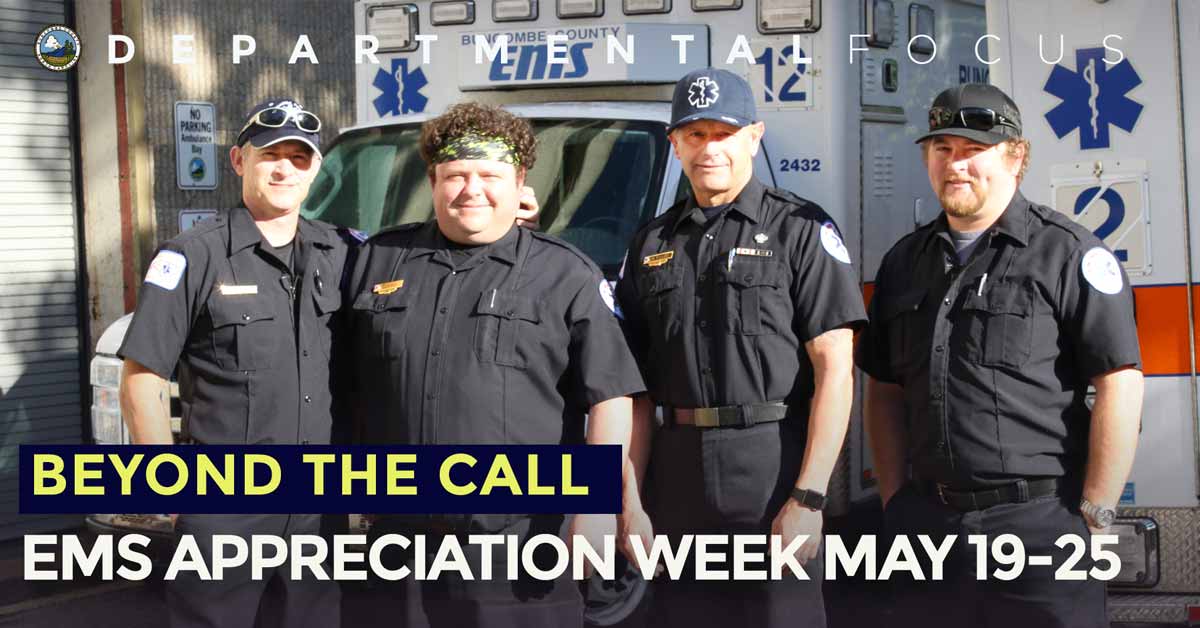This news item expired on Tuesday, March 17, 2020 so the information below could be outdated or incorrect.

Pictured above: Joe Vinzant, Chris Dorsey, Greg Fisher, and Chad Styles get ready to start their shift.
No matter the time or place, Buncombe County EMS always responds to your call for help. In fact, the team of highly trained paramedics and advanced EMTs arrived on scene more than 28,000 times while transporting some 19,000 patients to the hospital. “Our staff works in all types of weather, on holidays, weekends, and sometimes miss family events like school functions and sports,” says EMS Training Officer Jamie Judd. “They are dedicated to providing the highest level of care to anyone who calls 911 for a medical need.”
May 19-25 is EMS Appreciation Week and we are so proud of all our EMS staff. It’s a job that requires a significant amount of training, unwavering composure, and dedication. “No two shifts are ever the same and they never know what type of patient they will encounter,” explains Judd. “EMS has to be ready to provide the same level of care at 3 a.m. as they did at 1 p.m. the day before. This high-pressure, high-demand environment is what draws many people to work in EMS.”
Further, these Paramedics and Advanced EMTs are initiating life-saving procedures that are proven to reduce death rates and improve positive outcomes for patients. In fact, Buncombe County EMS has been recognized by the American Heart Association for the quality of care provided to patients suffering heart attack and stroke. “The majority of Buncombe County EMS staff have a college degree of some type, with most of them having an Associate’s degree or higher. EMS serves as the eyes of the ER doctors to recognize critically ill patients, begin needed treatment, and provide rapid safe transport to the emergency room,” notes Judd.
In honor of EMS Appreciation Week, Buncombe County is proud to thank and honor our EMS staff’s dedication and diligence that never takes a day off. If you want to show your appreciation for EMS staff anytime of the year, Judd says a simple “Thank you” when you see them out and about is enough. But he adds there are steps you can take to help them and the community at-large. “Another thing you can do is learn hands-only CPR and learn the signs of a stroke. These simple things can make a significant difference is patient outcomes,” explains Judd who notes you can get more information at heart.org.
We asked some of our paramedics to share why they thrive in high-pressure, high-stakes situations, and here’s what they told us:
Marvin McCoy, Paramedic:
“I knew I wanted to belong to a bigger group of medical rescuers, so EMS was it for me. It is not about you or me. It is about them, when they need you or me the most!”
Zach Manley, Paramedic:
“For me it was almost hereditary with my Dad, Granddad, and a few other family members growing up around EMS and firefighters. It is a great feeling to not only be part of the community, but to be there for people in time of need. We go out and hopefully give people hope and a chance to continue on with their lives here in Buncombe County.”
Liz Johnson, Paramedic:
“Every human being deserves a chance, EMS facilitates those chances. I watched my dad come close to the end after witnessing his motorcycle wreck when I was in college. I felt helpless in that moment, but I knew his time wasn't up. But in the worst moment of my life, I witnessed a bright light; I witnessed a stranger save his life. That stranger was an off-duty Paramedic. That Paramedic gave my dad a chance; a chance to see me graduate college, a chance to hug his twins again, and a chance to watch his daughter pursue her new dream of becoming a Paramedic, so that one day she could hopefully impact a stranger the way a Paramedic impacted her. We do this job to give every human being a chance.”